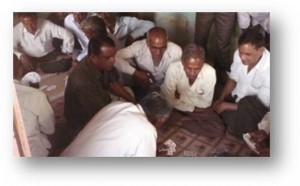 Who would have imagined that the game of bridge would be thriving in a remote village in central India; where largely illiterate farmers would proudly become the first generation players of this rather elite game?
Who would have imagined that the game of bridge would be thriving in a remote village in central India; where largely illiterate farmers would proudly become the first generation players of this rather elite game?
This remarkable story began in the year 1965 when a certain Mohammed Zia Khan came to Raibidpura (in the state of Madhya Pradesh) as a government veterinary doctor. Khan Sahib loved bridge, but whom could he play with? So he gathered a few people and started teaching them. Among his students was the promising Mansaran Pipaldia, who was totally illiterate. Eventually he became one of the legendary players of Raibidpura and Khan Sahib’s regular partner in bridge tournaments. Perhaps, due to the absence of television in the village, and no doubt due to Khan Sahib’s gentle, persuasive teaching, his students were steadily growing in number. The women, unfortunately, were left out.
I spoke to some village women, and they all said the men wasted their time playing Bridge. “What else can they do”, I asked them. “Isn’t it better that they play Bridge than gossiping, gambling or getting drunk? Look at the men in your neighbouring villages.”
The contrast between the men of Raibidpura and the other villages is most noticeable during election time. Alcohol consumption and associated violence become heightened elsewhere, but for as long as they can remember, the locals told me that Raibidpura has always been peaceful.
Hari Ram Patel, President of the Farmer’s Cooperative of Raibidpura, visits the police station once a month. On a couple of occasions, he said, the police have joked that they never seem to make any money from this village. “We do have our problems”, Hari Ram Patel said to me, “But we always try to resolve them amongst ourselves.”
Even the kids here are different, said Yash Kanoongo, grandson of eighty year old Amritrao Kanoongo, among the first generation of bridge players in Raibidpura. Yash (age thirteen) told me how children from the neighbouring villages (when he visits them) fight during cricket, using abusive language. This does not happen when he plays cricket in Raibidpura.
Many years ago there was a police directive from Khargone, the district headquarters, to stop all villagers from playing cards. Apparently, gambling had become a considerable problem. When the policemen came to Raibidpura, they were told: “Perhaps you have never heard of our game – we play bridge here, and we don’t gamble. Bridge is generally played in towns and cities – so to find out about our game, you would have to ask the Superintendent of Police in Khargone, or perhaps Indore. We are aware that some police officers do play bridge, and if those officers tell you to stop our game, we certainly will.”
The policemen never came back. Such an affirmative, confident manner of speaking is part of the culture of Raibidpura; the previous generation of bridge players used to regularly take part in tournaments, playing alongside judges, civil servants, police officers and professionals.
However, the first time Khan Sahib took his partner, Mansaran Pipaldia, to play in a tournament in Khargone, it was not easy. People clearly looked different, talked differently, they were smoking cigarettes and pipes, and Mansaran Pipaldia only had his packet of beedis. On Khan Sahib’s nod, he lit one. In order to sign on the attendance sheet, he asked for an ink pad and imprinted his right thumb.
“What!” the organizers wondered – “You play a foreign game, you bid in English and don’t know how to sign!”
But soon they realized that where it mattered, he was no pushover at the table. At the conclusion of the tournament, Khan Sabib and Mansaran Pipaldia had done quite well, winning the hearts of all the participants.
Thus, over the years more and more players from Raibidpura started taking part in the regional tournaments. In fact so popular were the Raibidpura players that the District Collector, Naggar Sahib, used to send a government car to pick up the players for the tournament held in Khargone, twenty two kilometers away.
Bridge-stories have become part of village folklore. Over endless cups of tea, I was told a few by Mulchand Jawra and Kailash Verma, my hosts in Raibidpura.
Case of the adulterated oil
In 1972 there used to be a grocery store in Raibidpura owned by Champalal Seth. He was a bridge player. Unknown to Champalal the cooking oil that he was selling was adulterated. One day the Government Food Inspector arrived at his shop to ask for a bribe. But Champalal was having none of this. So the Inspector went about his job and noticed the adulterated oil. He brought a case on Champalal in the district court of Khargone. Champalal had an honest reputation in the village and clearly he was cheated by the wholesaler who had supplied him the oil. The case went on for five years, but during the sixth year, the case got dismissed, when a new judge – a bridge player who had known Champalal from tournaments – took over.
At the foothills of the Satpura range, close to Raibidpura are beautiful hamlets of the Bhil tribe. Mansaran Pipaldia (Khan Sahib’s regular partner in tournaments) once bought some wood from a Bhil man and stored it in his cowshed. It must have been a considerable amount because it caught the attention of the Forest Inspector. Since no bribe was forthcoming, he confiscated the wood, taking it to Khargone.
Some time later (because time is vague in rural India) Khan Sahib and Mansaran Pipaldia met the Collector of Khargone District at a bridge tournament. After hearing what happened, the Collector ordered all the wood to be transported back to Mansaran Pipaldia’s cowshed at the Government’s expense.
Esta entrada también está disponible en: Spanish


